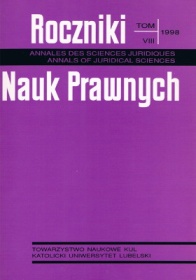Reflection after the Ratification of the Concordat
Abstract
The paper seeks to show the reflections on the concordat between the Holy See and the Polish Republic, the concordat which was signed on July 28, 1993, and ratified on February 23, 1998. It is an instrument in which to normalize the relationships between the state and the Church in the context of system transformations well under way, transformations leading from communist totalitarianism to democracy. The following problems make up the subject matter of the said reflections:
1) the historical dimension of the ratification at home and abroad which consisted in giving up the model of hostile separation - in its communist version - and accepting the model of coordinated separation, as it has been formed in democratic states of West Europe (Germany, Italy, and Spain),
2) the principles of institutional relationships between the state and the Church as they have been formed in art. I of the concordat and in art. 25 of the Polish Constitution of April 2, 1997,
3) Guarantees of religious freedom are generally written in art. 53 of the Polish Constitution and more particularly in the concordat,
4) the efficacy of the concordat in the national law, that is incorporation of the concordat norms to the national order, in the light of art. 87, 8 and 91 of the Constitution,
5) the comparisons of parallel records contained in the concordat and in the binding common laws in order to settle which concordat records confirm the norms that are already binding by virtue of the common laws; which concordat records introducing new norms may be directly used; which of the binding laws should be novelized in order to meet the concordat obligations.
Copyright (c) 1998 Roczniki Nauk Prawnych

This work is licensed under a Creative Commons Attribution-NonCommercial-NoDerivatives 4.0 International License.


